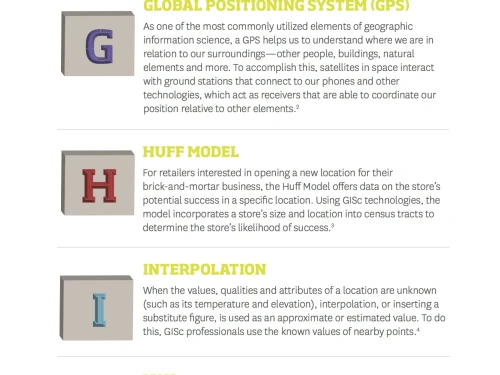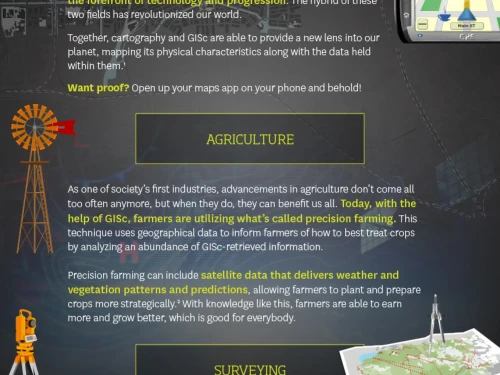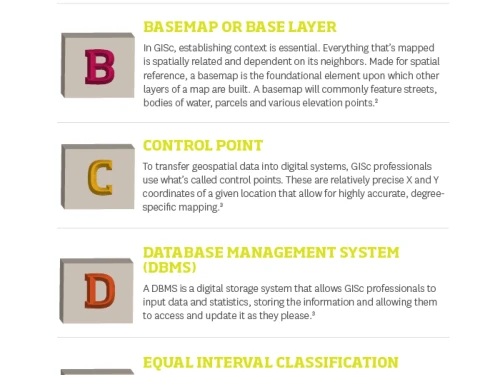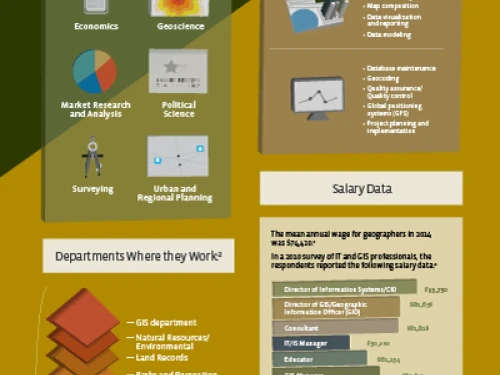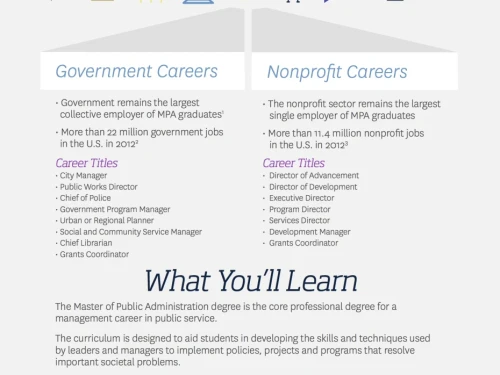Master’s Degree
Explore blog posts highlighting Kent State University’s online master’s degree programs, covering fields such as Music Education, Public Administration, Geographic Information Science, and User Experience. Learn about program rankings, faculty insights, and specialized courses designed to help professionals advance their careers. Discover opportunities for growth and expertise in a variety of disciplines.
Related Blog Posts
Every profession has a lexicon, turns of phrase that are unique to its processes and techniques. The world of geographic information science (GISc) is no exception.
Websites, eCommerce sites, email campaigns, eReaders, mobile apps and more—if you’ve used a screen or a keyboard lately, you’ve touched the work of someone with a job in user experience design (UXD).
For students who have prior experience in UX, come to the program with a willingness to challenge what you already know. While you may have developed a specific technique or process, use the program’s curriculum as an opportunity to supplement or improve your skillset.
Q&A with user experience design student, Jessica K (Kent State Online, ’17)
As history marches forward, certain technologies are inevitably left behind in favor of what’s most beneficial to society in the moment or in the future. While leaving behind what’s no longer beneficial is important to technology and innovation, it also renders certain industries and careers as outdated—no matter how important they may have been at one time.
The geographic information science (GISc) field is a diverse and rapidly growing industry in which some roles are projected to grow by 14% by 2026,1 which makes the role of a GISc technician all the more vital. As we watch natural disasters unfold and the effects of human interference take shape on our planet, the need for GISc expertise and spatial technology prowess is featured daily, worldwide. Additional GISc experience can help environmental protection professionals make significant impacts in solving major global crises like water resources or climate change.
The world of geographic information science (GISc) is filled with unique acronyms, phrases and definitions. Because of this wide range of terminology for tools, technologies and techniques used in the field, a glossary of important terms is as vital as it is extensive.
Q&A with user experience design student, Jessica K (Kent State Online, ’17)
Q&A with user experience design student, Jessica K (Kent State Online, ’17)
Q&A with user experience design student, Jessica K (Kent State Online, ’17)
It should come as no surprise that over 80 percent of adults in the United States use the internet.1 In fact, over half the world’s population owns a smartphone—a technology that relies exclusively on broadband for many of its primary functions.2 So, with the proliferation of internet usage being what it is, you’d expect that a similarly high percentage of citizens have access to affordable and reliable internet.
When I started Kent State University’s UX master’s program, I was excited about the opportunity to advance my education but apprehensive, because I had no UX experience prior to my enrollment. My expectations were to gain a general understanding of UX, develop a foundation for UX practices and be able to build a portfolio that I could use professionally in search for a career in UX.
When I was considering the Kent State program, I read some UX message boards where posters warned that having a master’s degree in UX would somehow make me less marketable, but now, having finished, the opposite has been true.
Like many, you may be interested in user experience design (UXD) as a concept. Yet, you may be in a different field and unable to see a clear connection of how your career could ever transition into UX design.
I can’t emphasize this enough: Consider each deliverable as possible portfolio material. Starting the course, I was so focused on learning, getting good grades and hitting those deadlines that I often overlooked adequately documenting the process. When it came time to create my portfolio, I struggled to recall all of the steps I took to arrive at my solution. Be sure to take some time after portfolio-worthy assignments to note the steps, objectives and results of your efforts. Your life will be much easier later on.
It’s no secret. The public’s confidence in the government is on the decline. In fact, a stifling 76 percent of citizens believe that political corruption is a critical problem facing us today. According to Kent State University professor Mark Cassell though, “When we talk about failed states, what we’re talking about is failed administrations.”
Data has transformed the way we live. There is so much information available to us these days that we can use it to make pinpoint and informed decisions that go beyond educated guesses or hunches. Data can be leveraged in almost any area of life and industry. Thomas Cuyler, a high school senior at School Without Walls in Rochester, New York, has decided to do both.
Racial segregation in the United States of America can be a sensitive or controversial subject that many people prefer not to discuss. The Civil Rights Act of 1964 was enacted to prevent discrimination based on race, skin color or national origin, and since that time, it might be taken for granted that segregation based on race no longer occurs in the United States.
What makes someone a repeat visitor to a website or motivates them to share it with their networks via social channels? There isn’t one correct answer to either of these questions, because there is a multi-layered, strategic approach to attracting and converting people into frequent visitors. Generally speaking, the best way to achieve this goal is to provide the site audience with valuable, relevant content.
So you’re a UXD professional tasked with building a website for a client that will not only draw people in, but keep them clicking around on the digital property for as long as possible. You’re aware that the Internet has caused people to consume vast amounts of information simultaneously, and a byproduct of this is that your site visitors have extremely short attention spans.
Incorporating video and a well-written, frequently updated blog can help attract the attention of consumers and potentially convert them into viable leads. Having a website that leverages social media integration can also help raise visibility and boost traffic.
A Master of Public Administration (MPA) degree helps prepare administrative professionals for advanced positions within the public sector, government and nonprofit organizations. Explore the infographic below to learn how an MPA can help pave the way to more senior job opportunities.
Most people considering a career in UXD may not fully understand the difference between user interface vs. user experience, but it’s a critical piece of of knowledge to understand. Ryan Spencer, a UX professional, explains these concepts in the most simple, yet matter-of-fact way possible.
Since you made it to this post, you’ve most likely heard of user experience design (UXD). You may even have a clear understanding of what it means already. For those who don’t, however, a UX designer is a person who works to make a platform or product as user-friendly, enjoyable and useful as possible for end users. This involves seamlessly integrating digital systems and technology into both traditional products and new, innovative products.
It’s no secret that we live in a digital world. The Internet has forever shifted the way that we listen to music, watch videos, read the news and connect with people from all over the world. When it comes to marketing and advertising, brands often try to make an impact with consumers using a variety of media, while hosting them all on a single website.
The paths of those who have arrived in public administration careers are varied and sometimes unpredictable. Often, the professionals who serve the public best are the ones who never necessarily saw themselves fulfilling those roles to begin with.
As more consumer-facing brands look for ways to keep their current customers while implementing measures to help attract new ones, creating a positive user experience has been at the forefront of any new initiatives. Unfortunately, unless something goes wrong, the importance of the user experience goes unnoticed.
From the technology in your car and computer to the technology in your phone and television, user experience design (UXD) is an integral component of our daily lives. As society continues to rely more and more on digital experiences, there will continue to be an increase in UX designer jobs, as businesses need well-trained experts who understand the effect of user interactions within our digital world.
Whenever you visit a website on a computer or smartphone, you’re probably not thinking about the layout and usability of it. As a consumer, you generally just want a site that works and navigates you quickly to the buttons that you click on the page. But the fact is that this pleasurable online experience was architected by an individual who understands exactly what people want when they’re online.

